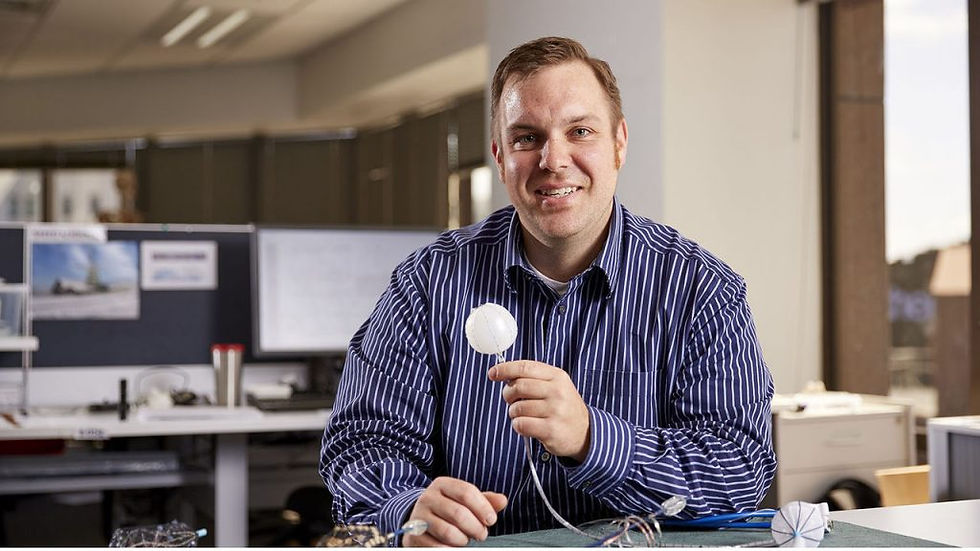Diagnosing elusive gut problems with med-tech: Cooper Award
- Kelly Smith

- Nov 25, 2024
- 3 min read
Updated: Nov 27, 2024
Dr Tim Angeli-Gordon has won the Royal Society's 2024 Cooper Award for his innovative work on diagnosing and treating chronic stomach issues with a gut sensor that measures electrical activity.

Tim Angeli-Gordon says chronic gut research will benefit from high-profile recognition in awards like those from the Royal Society
In honour of his groundbreaking research to resolve gut problems using bioengineering techniques, Dr Tim Angeli-Gordon has been awarded the Cooper Award by the Royal Society Te Apārangi.
Research by Angeli-Gordon and his team has led to the development of a new medical device that could allow clinicians to diagnose hard-to-identify stomach complaints, like gastroparesis, without invasive surgery. The endoscopic mapping device consists of an inflatable sphere covered in sensors which is inserted via the oesophagus. It’s able to measure electrical activity in the gut.
Gastrointestinal disorders can cause major clinical, economic, and societal burdens. Patients who have debilitating symptoms often have limited options for diagnosis and treatment.
Based at the Auckland Bioengineering Institute at Waipapa Taumata Rau, University of Auckland, for more than 10 years, Angeli-Gordon led an international team of engineers, clinicians, and physiologists in a study that applied high-resolution electrical measurement techniques, combined with cutting-edge tissue imaging, to investigate electrical and cellular abnormalities in patients with chronic nausea and vomiting.

Tim Angeli-Gordon with the endoscopic gut sensor device
He was the lead author of the paper Loss of Interstitial Cells of Cajal and Patterns of Gastric Dysrhythmia in Patients with Chronic Unexplained Nausea and Vomiting published in 2015 –a year after completing his PhD. These results laid the foundation for the new device.
Auckland Bioengineering Institute director Professor Merryn Tawhai describes Tim as "a truly deserving and outstanding recipient of the Cooper Award".
“Tim has built a stellar research career in gastrointestinal (GI) electrophysiology. He truly encompasses the 'bench to bedside' approach, developing new understandings of GI dysfunction, novel devices to measure it, and trialling new methods to treat GI disorders through gastric ablation," Tawhai says.
Earlier this year, Angeli-Gordon was appointed the Senior Rangahau and Innovation Manager at Te Manawahoukura, the Rangahau Centre at Te Wānanga o Aotearoa, but he continues to collaborate with his former colleagues through a partial appointment as a Senior Research Fellow at the Auckland Bioengineering Institute and the Department of Surgery at the University of Auckland.
"This is a win-win for both organisations, and something that few peoplecould do so successfully," Tawhai says. "Tim's deep commitment and appreciation for te ao Māori coupled with his research excellence and deep understanding of the research journey from innovation to impact are critical factors in his success."

Tim Angeli-Gordon (centre) with Distinguished Professors Geoff Chase (left) and Dame Jane Harding from the Royal Society
The Cooper Award (Royal Society Te Apārangi Early Career Research Excellence Award for Technology, Applied Science and Engineering) is awarded annually, and is named after Dr E.R Cooper, the first Director of the Dominion Physical Laboratory (from 1939 to 1950).
Members of the 2024 Cooper Award selection committee said they were impressed by Angeli-Gordon's ability to bridge the gap between engineering innovation and clinical applications.
"His leadership in transferring high-resolution electrical mapping techniques from the research laboratory to the operating room is a testament to his vision and commitment to translational medicine," the panel said.
Angeli-Gordon has received other prestigious grants, including a Fast Start Grant from the Marsden Fund worth $300,000, a Rutherford Discovery Fellowship worth $800,000, and most recently a Project Grant from the Health Research Council worth $1.2 million. He is a current member of The Auckland Medical Research Foundation’s Medical Advisory Committee.
Other 2024 Royal Society Te Apārangi awards for Waipapa Taumata Rau, University of Auckland academics included: Associate Professor Daniel Hikuroa, who received the Te Puāwaitanga Research Excellence Award recognising eminent and distinctive contributions to Te Ao Māori; Professor Andrew Allan, who received the Hutton Medal for outstanding research in plant genomics and breeding; Professor Michael Dragunow, who was awarded the Hercus Medal for world-leading research on the causes and treatments of brain disorders; and Professor Mark Mullins, who was awarded the Pou Aronui Award for a career of scholarship on religion in modern Japanese society.


Comments